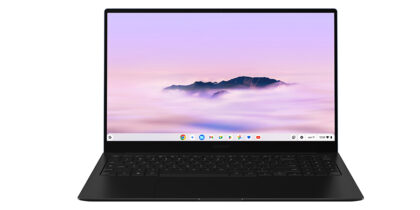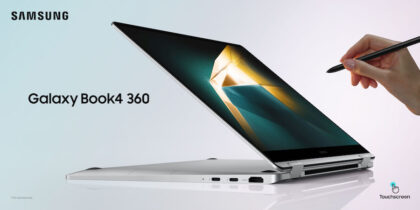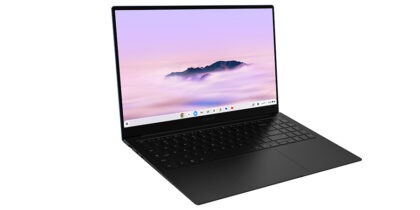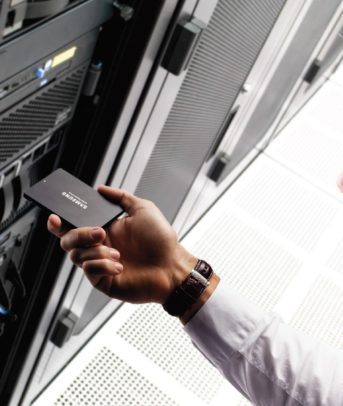For organizations looking to leverage cloud applications to increase their productivity — about 67 percent of small and medium-sized businesses (SMBs), according to Deloitte — Chromebooks offer a smart, flexible and easy-to-manage computing alternative to traditional PCs. Once considered a low-powered, low-cost solution for K-12 student computing, Chromebooks have come a long way over the past five years, and the latest devices are powerful tools to drive worker productivity and enhance security for any business.
The rise of cloud apps
The rise of cloud applications over the past decade has been rapid and is a prime driver for increased business productivity across virtually every industry.
More than 75 percent of enterprises have either deployed cloud applications or are in the process of moving to the cloud. And, according to the McAfee Cloud Report, 87 percent of companies experience business acceleration from the use of cloud applications and services. Spiceworks reports 45 percent of businesses are planning to move their entire server virtualization environment to the cloud within the next two years.
The Chrome landscape
Born at the intersection of hardware and software innovation, Chrome devices are tailored specifically to the cloud-driven nature of today’s business environment.
The Chrome device landscape today includes a broad spectrum of devices, from affordable models for school and personal use, to high-end options with 4K touchscreens, powerful Intel processors, ample onboard storage and advanced security features.
Mobile device management for beginners
Get started with MDM so your organization can spend less and do more — securely and efficiently. Download Now
At the premium end of the market, devices like Samsung’s new Galaxy Chromebook are causing more and more IT managers to think seriously about turning to the Chrome operating system (OS) for their remote workforce.
While businesses have typically looked to Windows as their OS of choice, the cloud-native Chrome OS has gained ground as a computing platform that can support workers in finance (bankers and insurance agents), healthcare (physicians, nurses and administrators), retail (store managers and corporate staff) and many other industries.
For IT decision makers across these industries, virtually all of their key line of business applications have shifted to the cloud over the past decade — whether it’s the CRM, the EHR, or the ERP. The same is true for office productivity apps, where cloud-based options such as Google Workspace (previously known as G Suite) have become the norm. This shift to the cloud has made Chrome devices all the more compelling.
Two app ecosystems
The latest Chromebooks provide enterprises access to two app ecosystems: web-based apps and extensions via the Chrome browser, and Android applications.
The Chrome browser is used for around two-thirds of all internet sessions today. Because of the strong Chrome user base, application developers have prioritized the Chrome experience in designing their sites and services, and many have published Chrome extensions via the Chrome Web Store to offer unique capabilities. Whether your team is working in Salesforce, signNow or Microsoft Office, extensions are available to improve the Chrome user experience.
Android apps started to become available on some Chromebooks back in 2016, and can be accessed on most Chromebooks launched after 2019. While not every app in the Google Play Store runs on Chromebooks, the cross-platform compatibility is a huge benefit for businesses providing Android smartphones or tablets to their workforce. The vast Android app ecosystem uniquely merges mobile and desktop computing experiences, allowing users to leverage the same mobile apps on their Chromebooks that they use on their smartphones.
Other Chromebook advantages
Beyond being an ideal platform for accessing cloud applications, Chromebooks offer businesses several other key benefits:
- Security: Chrome Enterprise is a modern platform that is secure by design, from the device, to the OS to the Chrome browser. Since the Chrome OS is designed as a read-only operating system with primary file storage happening in the cloud, Chrome devices have less exposure to malware. One of the biggest challenges with enterprise security today is ensuring all devices are kept up to date, but since Chromebooks update automatically this risk is eliminated.
- Management: The Chrome Enterprise Upgrade gives IT managers an intuitive console to manage a fleet of devices remotely, with hundreds of policies available to meet enterprise requirements at both the OS and browser-level. Deployment and management is zero-touch, since everything is done via the cloud. To make things easy for smaller businesses, Google has a range of default settings implemented to give admins a head-start on their device management.
- Total cost of ownership: Chromebooks typically cost less than Windows laptops, but the real savings come after you’ve purchased them. Because security and management is streamlined, businesses save time and resources managing their devices and apps.
As organizations look towards a future where cloud apps and remote work are the norm, now is the right time to recalibrate thinking around the mobile computing needs of the workforce. With Chromebooks, cloud adopters can enhance business security and drive productivity, giving employees the tools they need to get the job done from near or far.
Learn more about the productivity power of Samsung’s new Galaxy Chromebook. And discover five newfound business advantages of Samsung’s Galaxy Chromebook.






